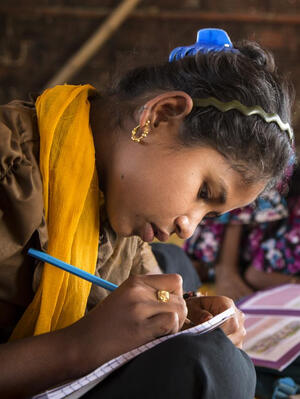
HER FUTURE
the fight for girls education
created by maye adanza & jelsie saul
While all of this can be more or less attributed to misogyny, there is a crossroad where misogyny and poverty overlap that causes an entirely new problem to arise. So, even when one isn't outright against a girl receiving her education, they still feel the unforgiving hand of misogyny. Allow me to explain:Historically, males have always been seen to hold value over females. They are perceived as stronger, more competent - as better investments. This perception does not disappear overnight and still is prevalent in current times. A prime example that showcases this is when you take a look at China's one-child policy (disbanded in 2015). It was a policy made to serve as a solution for the country's rapid overpopulation. This led to a nationwide problem of female infanticide. Many daughters were either aborted, abandoned, given away, or have mysteriously gone "missing." This, on its own, does not have much to do with our point, but it shows that if only granted one child, most would prefer to have a son.They would have a better chance of success in society and are seen as a better option to carry on the family name. This also applies to education. In a lot of underdeveloped countries, education as a whole is already seen as a privilege many cannot afford to have. Even if primary-level education is free, many have to work to support their families instead. A chance at a higher education (or any education) is seen as an investment for your child. So, if you are impoverished and can only send one child to receive a higher education, who do you think would be seen as a safer investment with a higher chance of success? A son, or a daughter?Centuries and centuries of living under a patriarchy does not erase this bias so easily from most people's brains, especially with those who can only afford to think of survival.
Another barrier that often hinders a girl's ability to stay or thrive in school is child/teen pregnancy. This is something that can happen to most cis teen girls, but mostly impacts girls from lower-income backgrounds. Around 21 million girls aged 15-19 in developing regions get pregnant annually.Girls who get pregnant out of wedlock are often shamed and ridiculed, creating a hostile environment for them at school. If they are to keep the baby (whether by choice or, more often, not.), it would be harder to focus on their studies. It is made very difficult to juggle both your pregnancy and your education at once. Many girls in this situation end up having to forgo their schooling, while the male that got them pregnant has more freedom to continue their life as it was before.Ironically enough, girls with less education and lower economic standing have a significantly higher risk of getting pregnant, yet pregnancy is also a reason why girls would be stopped from receiving adequate schooling.This could be solved if more accommodations and empathy were shown to these girls.
Girls are disproportionately more likely to face gender-based violence and/or sexual crimes. 82% of all victims under the age of 18 are female.This can very well serve as a barrier to a girl's education. Sexual abuse negatively impacts one's psyche and well-being. It has been shown to cause insomnia, depression, and anxiety. This can make one lose motivation in their schooling and cause them to fall behind.What makes it worse, is if the problem lies within the school itself. One in ten female graduate students at major research universities report being sexually harassed by a faculty member. This obviously creates a hostile space for women. How are they expected to learn as well as their male counterparts if they are statistically less likely to be safe at their place of education?
Annually, 12 million women under the age of 18 are married off and forced to take on a domestic role as a housewife and mother. Because of this, an education seems futile. Many victims of child marriage don't finish school so they can focus on their domestic duties.This affects one's development and overall knowledge while also placing them in a dangerous position. These girls were already being exploited and abused, now they are completely dependent on their husband with no way to stand on their own.
Period poverty is the lack of access to menstrual products and hygiene facicilities. Lower-income girls or those who live in areas that cannot provide them with the proper tools to conveniently and discretely menstruate face extra barriers when it comes to their education.Many of the girls that live this reality often have to miss school each month when their period comes, causing them to lose out to valuable learning and making it more difficult to keep up with their studies. Girls that miss school during their period can lose up to 20% of the school year.IIf they fall behind enough and are unable to pass their year-end exams due to their missed schooling, they may not be able to return to school. In some countries, one is not allowed to return if they failed their year. And even if they can, many parents are not willing to pay for their daughter to repeat her year. That leaves young girls with little choice except to drop out and get married off.Shame also plays a factor in this specfic sub-issue of the topic. Periods are stigmatized worldwide. There is a lot of taboo and misinformation that surrounds such a subject, often leading to the discrimination and alienation of menstruating girls. This can lead to exclusion and missed opportunities either through outright discrimination or just lack of confidence due to ridicule.
